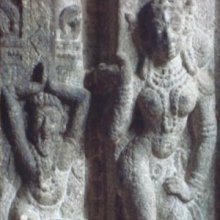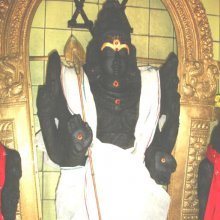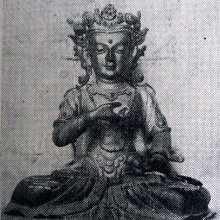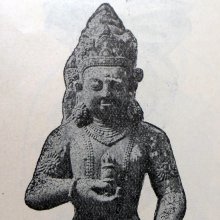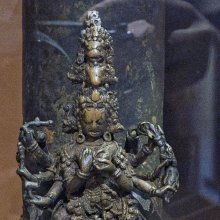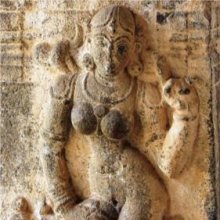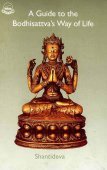Secret, Secrecy, Secretly: 2 definitions
Introduction:
Secret means something in Hinduism, Sanskrit. If you want to know the exact meaning, history, etymology or English translation of this term then check out the descriptions on this page. Add your comment or reference to a book if you want to contribute to this summary article.
Images (photo gallery)
(+28 more images available)
In Hinduism
Shaivism (Shaiva philosophy)
Source: SOAS University of London: Protective Rites in the Netra TantraSecrecy in Tantric practices.—For the medieval Śaiva practitioner, the deities, mantras, icons, and maṇḍalas are aesthetic manifestations or corporalizations of that which already exists, rather than a creation of something new. The complexity of such a world reinforces the Tantric tendency toward a professional class of practitioners who work in secrecy. These Gurus are first initiated and then trained to call upon and interact with deities and demons.

Shaiva (शैव, śaiva) or Shaivism (śaivism) represents a tradition of Hinduism worshiping Shiva as the supreme being. Closely related to Shaktism, Shaiva literature includes a range of scriptures, including Tantras, while the root of this tradition may be traced back to the ancient Vedas.
Yoga (school of philosophy)
Source: ORA: Amanaska (king of all yogas): A Critical Edition and Annotated Translation by Jason Birch(Great) Secrets are denoted by the Sanskrit term Gupta or Sugupta, according to the Amanaska Yoga treatise dealing with meditation, absorption, yogic powers and liberation.—Accordingly, as Īśvara says to Vāmadeva: “[...] [Now], I shall define the nature of that highest, mind-free absorption which arises for those devoted to constant practice. [...] By means of an absorption for ten nights, the best of Yogins who is established in himself sees any number of very secret (sugupta) and greatly strange things. [...]”.

Yoga is originally considered a branch of Hindu philosophy (astika), but both ancient and modern Yoga combine the physical, mental and spiritual. Yoga teaches various physical techniques also known as āsanas (postures), used for various purposes (eg., meditation, contemplation, relaxation).
See also (Relevant definitions)
Starts with: Secret formula, Secretary.
Ends with: Supreme secret.
Full-text (+2033): Rahasya, Guhya, Pracchanna, Gupta, Gudha, Rahas, Sugupti, Ghanasamvritti, Aprakasha, Guha, Guptacara, Antardvara, Antarbhedi, Gudhabhashita, Sarahasya, Lapunachapuna, Channa, Bheda, Guptaghala, Rahassa.
Relevant text
Search found 327 books and stories containing Secret, Secrecy, Secretly; (plurals include: Secrets, Secrecies, Secretlies). You can also click to the full overview containing English textual excerpts. Below are direct links for the most relevant articles:
Manusmriti with the Commentary of Medhatithi (by Ganganatha Jha)
Verse 7.58 < [Section IV - Duties of the King]
Verse 9.261 < [Section XXXVII - Detection of Criminals]
Verse 7.149 < [Section XII - Daily Routine of Work]
Saying 62 - Jesus Tells His Secrets To The Worthy
Saying 33 - No One Hides A Lamp
The Jataka tales [English], Volume 1-6 (by Robert Chalmers)
Jataka 305: Sīlavīmaṃsana-jātaka < [Volume 3]
Jataka 473: Mittāmitta-jātaka < [Volume 4]
Jataka 518: Paṇḍara-jātaka < [Volume 5]
Guhyagarbha Tantra (with Commentary) (by Gyurme Dorje)
Commentary 1.2: The classification (of commitments) < [Chapter 19 (Text And Commentary)]
Text 22.1 (Commentary) < [Chapter 22 (Text And Commentary)]
Tiruvaymoli (Thiruvaimozhi): English translation (by S. Satyamurthi Ayyangar)
Pasuram 7.10.11 < [Section 10 - Tenth Tiruvaymoli (Inpam payakka)]
Pasuram 6.2.7 < [Section 2 - Second Tiruvaymoli (Min itai matavarkal)]
Pasuram 6.8.2 < [Section 8 - Eighth Tiruvaymoli (Pon-ulaku aliro)]
Related products
(+7 more products available)
